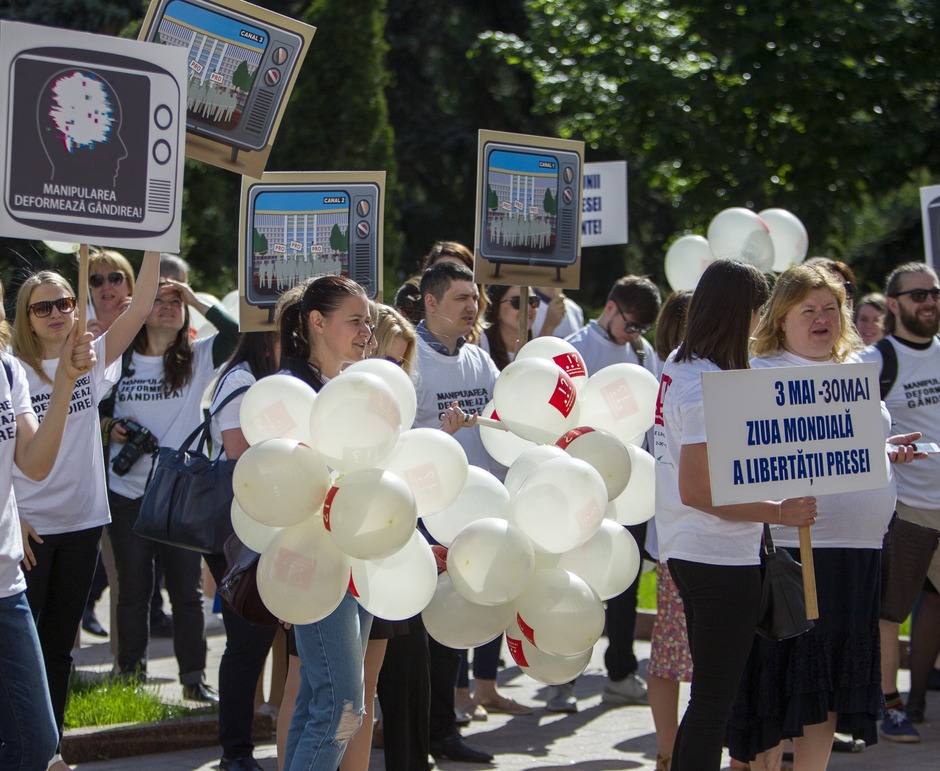Moldova: Journalists Under Unprecedented Fire Before Election
Journalists in Moldova have exposed corruption, fraud and embezzlement by politicians, and they are increasingly coming under attack because of it.
With Moldovan politicians locked in a ‘total war’ for parliament in an election next month, journalists have become increasingly exposed to pressure, threat and verbal and physical abuse on a scale not seen since independence, the director of the Moldovan Centre for Investigative Journalism says.
Cornelia Cozonac cited “at least 10” cases of journalists being targeted by politicians, civil servants and others with verbal abuse, death threats or physical attack. “In previous years, this phenomenon has not been so pronounced,” Cozonac told BIRN in an interview.
“The year 2018 was a pre-election year; political parties that want to come to power in 2019 have launched all sorts of electoral actions and the press has in fact spoiled their plans, producing very good investigative stories on them,” she said. Such stories had exposed major corruption, fraud and embezzlement in the public sector. “And that upsets many politicians,” Cozonac told BIRN.
In one prominent case in December, Socialist MP Oleg Savva, who is running for re-election, openly threatened investigative journalist Mariana Colun with physical violence if she or anyone else wrote about his affairs or those of anyone else in his party. The pro-Russian MP made derogatory remarks about the origins of Colun’s mother, who is ethnic Romanian, and told the journalist she should move to Romania. He was supported by two party colleagues who made similar remarks. Cozonac said such hate speech towards journalists was growing in public appearances by politicians and online.

Dangerous precedent
Ilan Shor, the convicted mastermind of a $1 billion bank heist and leader of the Ilan Shor Party, has also made death threats against journalists. In August last year, his bodyguard physically attacked Radio Free Europe/Radio Liberty reporter Nicu Gusan as Gusan tried to get a statement from Shor in the capital Chisinau’s main square.
And in October, police prevented Ziarul de Garda investigative journalist Viorica Tataru from filming a rally of the ruling Democratic Party in the square, saying she did not have “special authorisation”.
Such cases went viral on the Internet and daily news bulletins and were condemned by media NGOs in Moldova, but no one was ever sanctioned.
“These situations create a dangerous precedent and unease for journalists,” said Cozonac.
Cozonac lamented that such intimidation was deterring young journalists from getting into investigative journalism, a trade that requires courage and a rejection of self-censorship. Besides physical or verbal abuse, Cozonac said journalists faced immense pressure from the nature of the advertising market in Moldova, which is largely in the hands of two large companies de fact controlled by the biggest parties in the country –the pro-Russian Socialist Party and the Democratic Party.
According to independent studies, media affiliated with the Socialist Party and Moldovan President Igor Dodon hold about 20 per cent of advertising media, while almost 80 per cent is owned by media outlets aligned with the Democratic Party, led by billionaire media mogul Vlad Plahotniuc.
“Basically, the advertising financial stream is controlled and directed to certain media,” said Cozonac. “There have been a number of cases where business people told media institutions that they cannot offer publicity contracts because they are afraid they may be confronted later.”
Most independent media in Moldova survives with the help of Western donors.
“The independent press almost exclusively gets by on international grants and funding,” Cozonac told BIRN. “Even broadcasters with very high costs are forced to access projects to cover their expenses as advertising brings in very little.”
Propaganda, fake news and trolls
The politicisation of media has also helped the spread of disinformation, propaganda and fake news. Some analysts cite a fictitious report that pro-European presidential candidate Maia Sandu had struck a deal with Germany for Moldova to host 30,000 Syrian refugees as swinging the 2016 presidential election narrowly in favour of Dodon.
The ‘news’ was heavily circulated by media outlets affiliated with the Socialists and the Democrats. Cozonac said the phenomenon of fake news was “increasingly acute and very serious”.
More than 80 per cent of Moldovans get their news from television, while the 10 per cent who rely on the Internet and social media are increasingly exposed to politically-affiliated trolls. Cozonac said that with the level of corruption in Moldova, Europe’s poorest country, investigative journalists did vital work.
“It is they who dig up and expose corruption schemes and private interests in the spending of public funds,” she told BIRN. “It’s increasingly difficult for you to do your job well and to write good stories, but that’s also the challenge and the charm of our profession. The harder it gets, the harder you encourage yourself to look for the truth and to bring it to light.”
24 January 2019
Disclaimer: All views, opinions and accounts included in the RAI News Section are those of the authors; their inclusion does not imply official endorsement or acceptance by RAI. The News Section reflects the selection of topics of informative value to the organization and its stakeholders. Its content is taken from press/media sources and does not in any way reflect official RAI Secretariat policy. RAI Secretariat is not responsible for possible inaccuracies in media reports.
